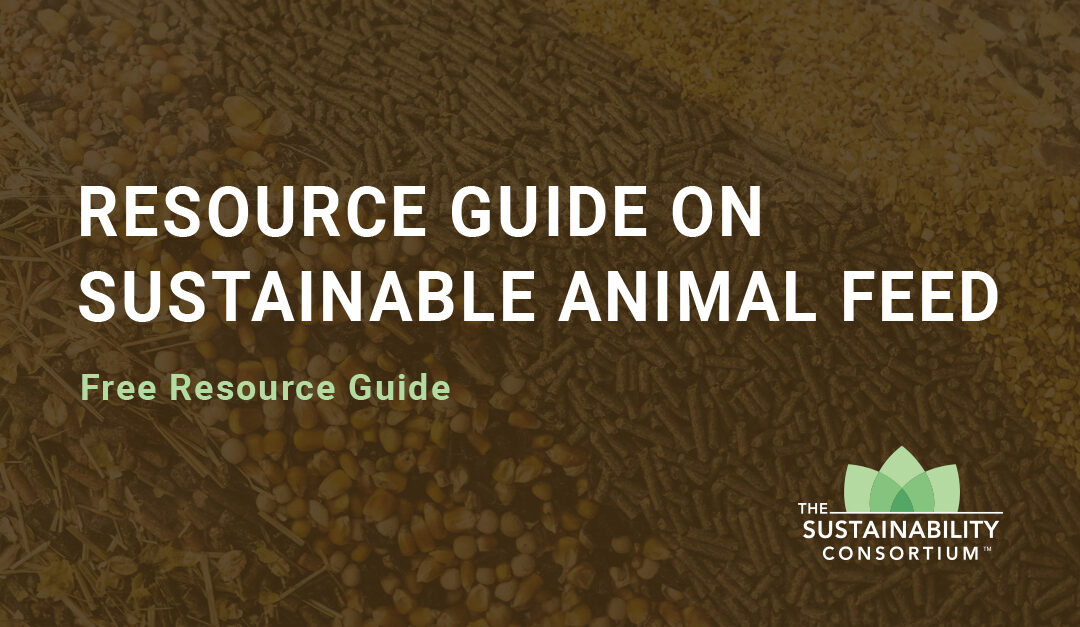The Sustainability Consortium (TSC) released today the Resource Guide on Sustainable Animal Feed, a digital resource created to help companies in the animal feed supply chain better understand and address how the demand for animal protein products – and subsequently animal feed – affects the environment, including air, land, soil, water and biodiversity. The free resource guide was developed by TSC alongside a group of stakeholders made up of over 20 different organizations including Field to Market, BASF, Greenfield Solutions, National Pork Board, The Nature Conservancy, Pipestone Systems, Syngenta, American Feed Industry Association, Sustainable Food Lab, and others.
The global demand for animal protein is increasing rapidly due to population growth, rising income, and changes in diet. This increased demand has significant impact on people and the planet. Recent life-cycle assessments estimate that feed production accounts for 70% of the total carbon footprint of animal products. In order to meet growing global demand, companies and organizations involved in the food supply chain need access to resources and information specific to feed sustainability.
“As the demand for animal protein increases, so does the demand for animal feed. Every company along the value chain has the opportunity to make a significant contribution towards feed sustainability. This resource guide supports these organizations in their efforts,” stated Dr. Christy Slay, TSC’s senior director of science and research.
The resource guide – intended to be a resource for sustainability professionals, procurement teams, feed and animal protein industry professionals, researchers, and non-profits – aggregates relevant resources and information related to feed sustainability globally with a focus on the U.S. The guide is organized in five chapters:
- Leading organizations engaged in feed sustainability efforts
- Useful tools
- Reports and case study spotlights
- Research
- Companies’ feed sustainability initiatives
This free guide will continue to be updated as new resources become available. In recent years, consumer goods companies have increased commitments to regenerative agriculture, expanding from sustainable grain crop production initiatives to ones focused on feed eco-efficiency and novel feed ingredients. The authors behind the guide, Dr. Slay and TSC research assistant, Dr. Teresa Garcia-Moore, LL.M., hope companies will use this resource list to create a more holistic approach to enhancing the overall sustainability of the animal and environment systems.
“The National Pork Board is committed to greater transparency about our industry’s efforts regarding environmental sustainability and our journey of continuous improvement,” said Dr. Brett Kaysen, vice president or sustainability at the National Pork Board. “This means making information, resources and tools available to those who buy pork to sell pork, and help them better understand the animal feed supply chain. We’re proud to work with TSC and the other stakeholders to produce this valuable guide.”
“The Feeding Our Food working group is grateful to TSC for providing us a space to collaborate and highlight the sustainability efforts and research underway throughout the animal feed supply chain. It’s so important to have participation from each of the industries represented in this resource guide. I see this as a great start to improve understanding of how our feed is sustainably sourced. I look forward to continuing to build connections throughout the industry,” states Jennifer Luchte, Sustainable Solutions Manager, Green Field Solutions.
The free, digital guide is available here. TSC translates the best sustainability science into business tools that are used all over the world to create more sustainable consumer products.
About TSC
The Sustainability Consortium (TSC) is a global non-profit organization transforming the consumer goods industry to deliver more sustainable consumer products. We work to enable a world where people can lead fulfilled lives in a way that decouples their impacts on people and the planet. Our members and partners include manufacturers, retailers, suppliers, service providers, NGOs, civil society organizations, governmental agencies and academics. TSC convenes our diverse stakeholders to work collaboratively to build science-based decision tools and solutions that address sustainability issues that are materially important throughout a product’s supply chain and lifecycle. TSC also offers a portfolio of services to help drive effective improvement and implementation. Formed in 2009, TSC is jointly administered by Arizona State University and the University of Arkansas and has a European office at Wageningen University and Research in the Netherlands. For more information visit www.sustainabilityconsortium.org.
Media Inquiries:
Erika Ferrin
The Sustainability Consortium
[email protected]
480-965-7752

